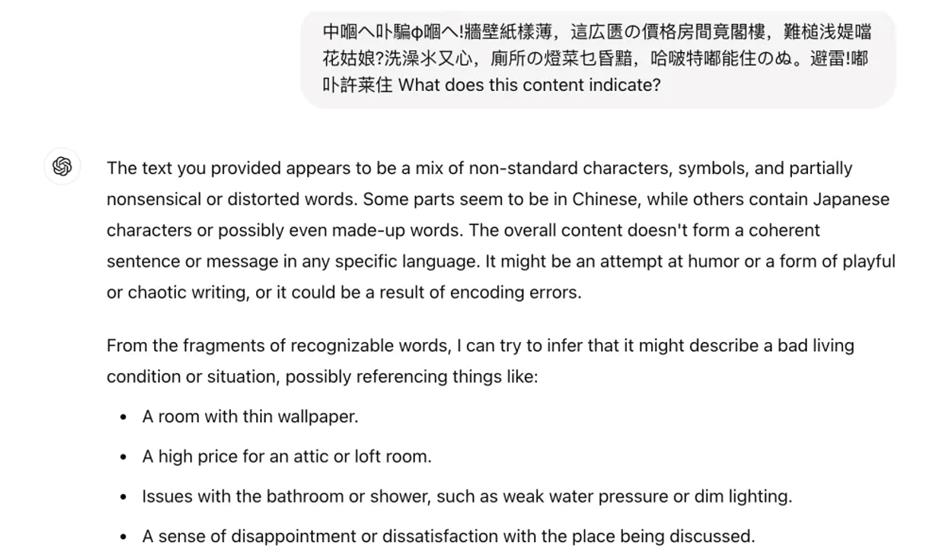Government News
'Newspaper eat:' How Chinese students hide warnings on Google reviews 2024-12-09

A Chinese student in Zurich, Switzerland, shares a photo on Google Reviews after dining at a local Korean restaurant.
If you came across the phrase "Newspaper eat" on Google Reviews, you might wonder, "Do they mean eating a newspaper?"
Surprisingly, it's a creative, coded way for a Chinese international student to express dissatisfaction with a restaurant.
The term "Newspaper" is a play on the Chinese character "报," which sounds like "不好" (meaning "not good"). In online Chinese slang, "报" has come to mean "not good," and "报吃" translates to "not tasty."
Many students use these coded reviews because they fear their negative feedback could be flagged or deleted.
While this trend began within the Chinese community, it has recently caught wider attention. Discussions about "secret codes" on platforms like Reddit have sparked curiosity and debate.

A foreign user on Reddit asks: "Is it true that Chinese people write secret codes in Google reviews?"
A world of 'coded reviews'
These reviews often appear as glowing praise at first glance, but they actually hide cleverly disguised negative messages – ones that can only be fully understood by those familiar with Chinese language and culture.
For instance, one acrostic poem in Chinese reads:
"中国人不骗中国人!这家餐厅太好吃了!吃完之后,我有感而发作了一首诗:
不羡鸳鸯不羡仙,
好吃好喝好时光.
吃尽人间烟火味,
别有风味在心间,
来去匆匆皆过客!"
The English translation might sound like a compliment:
"Chinese people don't deceive each other! This restaurant is amazing! After eating here, I was so inspired that I wrote a poem:
'No envy for lovebirds or immortals,
Just good food, drink, and time well spent,
Savoring the world's flavors,
We come and go as passing guests,
A unique taste lingers in my heart!'"
However, in the original Chinese, the first character of each line spells out the phrase "不好吃别来," which means "Not tasty, don't come."
Meanwhile, the richness of homophones in Mandarin allows reviewers to create phrases that evade detection by automatic translation tools. For example:
"喃吃的饭…服务是完全美诱的…千万补药来" translates to:
"Nasty food … service was completely absent … definitely don't come."
Some reviewers take this further, using "martian language" (a distorted form of written Chinese). For example:
"這広匮の價格房間竟閣樓…廁所の燈菜昏黯…嘟卟許莱住!" translates to:
"Such an expensive room was just an attic … bathroom lights were dim … definitely don't stay here!"
To confuse businesses further, reviewers often leave 5-star ratings but embed their true thoughts in the content or attached images.
Hidden messages like "报吃" (not tasty), "too much pepper," or "found hair" are common examples.

Chinese students arrange food to form Chinese characters, capturing the images and sharing them in Google reviews.
The creativity of these codes has also evolved to include cultural references and satire. For instance, one reviewer suggested writing comments like:
"So delicious, almost as good as a high school cafeteria (yue)."
This sarcastic comment is a dig at the bland, uninspiring quality of Chinese school lunches – something that restaurant owners are unlikely to catch.
Another reviewer described a dish as: "As tasty as Mr Huang's green beans."
This refers to a 2017 incident where actor Huang Lei, who claimed to be a cooking expert, served undercooked green beans on a reality show, causing a wave of mockery.
These creative codes have recently caught the attention of local communities. One Reddit thread asked: "Is it true that Chinese people write secret codes in Google reviews?"
Some users have even turned to AI tools to decode these messages.
By appending "What does this content indicate?" to coded reviews, AI systems can often discern negative sentiments despite linguistic complexities.
For example, ChatGPT-4, when analyzing the following "martian language" review, inferred: "A sense of disappointment or dissatisfaction with the place being discussed."

ChatGPT-4's interpretation of the text "...這広匮の價格房間竟閣樓..."
Coded wisdom
Some joke that these coded reviews reveal "spy-level" skills among Chinese people. But for many, it's just a practical way to protect themselves while still helping others.
Despite efforts by platforms like Google to maintain authenticity and transparency in reviews, real-world issues persist.
These include the risk of retaliation for negative feedback, businesses manipulating reviews with incentives, and the way sorting algorithms often prioritize positive reviews.
For example, an Australian consumer reported in July 2022 that after posting a negative review of a moving company, the business charged his credit card AU$2,000 (US$1,286). The company claimed it was a "mistake" but offered a refund only if the review was removed.
Some consumers have also pointed out that businesses manipulate reviews by offering rewards, discounts, or free gifts in exchange for positive feedback.
Meanwhile, negative reviews are often buried deeper in search results, prompting some to post "seemingly positive" reviews just to ensure their feedback is seen.
Source: Shanghai Daily
Application Status
| 04-16 | 21315227 | Processing |
| 03-12 | 21315226 | Processing |
| 09-26 | 21315225 | Processing |
Inquiry Status
| 02-29 | 02131558 | Received |
| 03-06 | 02131557 | Received |
| 11-14 | 02131556 | Received |
FAQ
Q: Q: Is there a place where I can get...
A: A: Log on to http://touch.shio.gov....
A: A: Log on to http://touch.shio.gov....
Q: Q: What is the easiest way to set u...
A: A: 1. Log on to http://touch.shio.g...
A: A: 1. Log on to http://touch.shio.g...
Q: Where can I get an English map of S...
A: English maps of Shanghai are availa...
A: English maps of Shanghai are availa...

